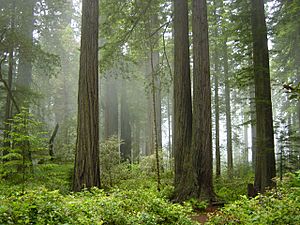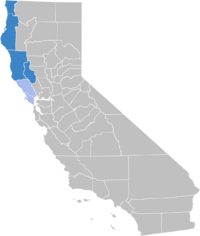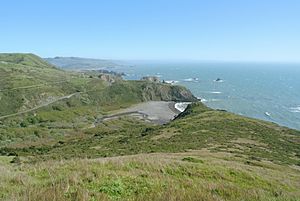North Coast (California) facts for kids
Quick facts for kids
North Coast
|
|
|---|---|
|
Region
|
|

Coast Redwood forest in Redwood National Park
|
|

Location of the North Coast in California
(The lighter shaded area includes Bay Area counties that are included in some definitions) |
|
| Country | United States |
| State | California |
| Area | |
| • Land | 10,176.86 sq mi (26,357.9 km2) |
| Population | |
| • Total | 987,361 |
| • Estimate
(2019)
|
1,003,281 |
| • Density | 99/sq mi (38/km2) |
The North Coast of California is a beautiful region in Northern California. It stretches along the Pacific coast from the San Francisco Bay up to the border of Oregon. People sometimes call it the Redwood Empire or the Redwood Coast because of the many huge redwood trees that grow there.
This region usually includes three counties: Mendocino, Humboldt, and Del Norte. Sometimes, it also includes Lake and two counties from the San Francisco Bay area: Marin and Sonoma.
Contents
Cities and Towns of the North Coast
Much of the North Coast is a rural place, meaning it has lots of open land and not many big cities. The largest city in the region is Santa Rosa, located in Sonoma County. It has about 178,000 people.
If you only count the three main counties (Mendocino, Humboldt, and Del Norte), then Eureka in Humboldt County is the biggest city, with about 27,000 people. Even though these cities are smaller than some others in California, many of them are very important to the history and culture of the region.
County Seats: Important Towns
A county seat is like the main town or city in a county. It's where the local government offices are. Here are the county seats for the counties in the North Coast region:
- Del Norte County: Crescent City
- Humboldt County: Eureka
- Lake County: Lakeport
- Marin County: San Rafael
- Mendocino County: Ukiah
- Sonoma County: Santa Rosa
Exploring the North Coast's Geography
The North Coast's shoreline stretches along the Pacific Ocean. It goes from San Francisco Bay all the way to the Oregon border. This coastline often has rocky cliffs and hills, making it hard to reach the water in some places. You can also find streams and cool tide pools there.

From Centerville Beach to the Klamath River, the coast is mostly sandy beaches. Many small towns and a few cities are found along Highway 101, which is the main road through this area.
Mountains and Forests Inland
Further inland, away from the coast, you'll find rugged mountains. These mountains are often steep and are cut through by rivers and narrow valleys. The area is covered in dense forests of redwood, Douglas fir, and oak trees.
The weather changes a lot from the coast to inland. The coast often has fog and mild winters and summers. But inland, summers can be very hot and sunny. Higher up in the mountains, you might even see snow in winter!
The "Redwood Curtain" and Lost Coast
The southern part of the North Coast has more cities and towns. However, most of the region is rural. The more northern and remote areas are sometimes called "behind the Redwood Curtain." This name means they are a bit isolated and hidden by the huge redwood forests.
A special part of the coastline in Mendocino and Humboldt Counties is known as the Lost Coast. It's very remote and can only be reached by a few small roads. You can find amazing beaches at Marin Headlands and Point Reyes National Seashore in the south. There are also countless hidden beaches north of the San Francisco Bay area.
Home of the Giant Redwoods
The incredible beauty of the redwoods can be seen all over the North Coast. You can visit protected groves like Muir Woods National Monument and Armstrong Redwoods State Natural Reserve in the south. Further north, you'll find massive forests in Humboldt Redwoods State Park along the famous Avenue of the Giants.
Many other State and local parks also have redwoods. Most of these parks are located along Highway 101. Some of the larger redwood parks include Prairie Creek Redwoods State Park, Del Norte Coast Redwoods State Park, Jedediah Smith Redwoods State Park, and Redwood National and State Parks. These parks protect most of the remaining old-growth redwoods, which are ancient trees that have never been cut down.
North Coast Population Over Time
| Historical population | |||
|---|---|---|---|
| Census | Pop. | %± | |
| 1860 | 23,855 | — | |
| 1870 | 42,429 | 77.9% | |
| 1880 | 68,146 | 60.6% | |
| 1890 | 89,466 | 31.3% | |
| 1900 | 104,159 | 16.4% | |
| 1910 | 133,711 | 28.4% | |
| 1920 | 143,720 | 7.5% | |
| 1930 | 175,347 | 22.0% | |
| 1940 | 200,380 | 14.3% | |
| 1950 | 307,197 | 53.3% | |
| 1960 | 467,917 | 52.3% | |
| 1970 | 576,296 | 23.2% | |
| 1980 | 715,718 | 24.2% | |
| 1990 | 841,241 | 17.5% | |
| 2000 | 946,193 | 12.5% | |
| 2010 | 987,361 | 4.4% | |
| 2019 (est.) | 1,003,281 | 1.6% | |
| Sources: 1790–1990, 2000, 2010, 2019 Chart does not include Indigenous population figures. |
|||
The North Coast region has grown a lot over the years. In 2010, about 987,361 people lived there. By 2019, the population was estimated to be over 1 million people! This chart shows how the population has changed since 1860.
Getting Around: Transportation in the North Coast
The North Coast has several important roads and ways to get around.
Major Highways for Travel
 Interstate 580
Interstate 580 U.S. Route 101 – This is the main road that goes north and south from San Francisco to Crescent City.
U.S. Route 101 – This is the main road that goes north and south from San Francisco to Crescent City. U.S. Route 199 – Connects U.S. Route 101 near Crescent City to Interstate 5 in Grants Pass, Oregon.
U.S. Route 199 – Connects U.S. Route 101 near Crescent City to Interstate 5 in Grants Pass, Oregon. State Route 1 – A famous scenic highway that runs along the coast.
State Route 1 – A famous scenic highway that runs along the coast. State Route 12
State Route 12 State Route 20
State Route 20 State Route 36
State Route 36 State Route 37
State Route 37 State Route 96
State Route 96 State Route 116
State Route 116 State Route 121
State Route 121 State Route 128
State Route 128 State Route 131
State Route 131 State Route 162
State Route 162 State Route 169
State Route 169 State Route 175
State Route 175 State Route 197
State Route 197 State Route 200
State Route 200 State Route 208 – (This used to be a route from Rockport to Leggett.)
State Route 208 – (This used to be a route from Rockport to Leggett.) State Route 211
State Route 211 State Route 222
State Route 222 State Route 253
State Route 253 State Route 254 – (This is the Avenue of the Giants, an older part of U.S. 101.)
State Route 254 – (This is the Avenue of the Giants, an older part of U.S. 101.) State Route 255
State Route 255 State Route 271 – (Another older part of U.S. 101.)
State Route 271 – (Another older part of U.S. 101.) State Route 283 – (Also an older part of U.S. 101.)
State Route 283 – (Also an older part of U.S. 101.) State Route 299
State Route 299
Public Transportation Options
You can also get around the North Coast using public transportation.
- Buses: National bus services like Amtrak and Greyhound serve the area. There are also local bus services within counties, such as Golden Gate Transit, Mendocino Transit Authority, Humboldt Transit Authority, and Redwood Coast Transit. Some towns have their own bus systems too, like Cloverdale Transit and Petaluma Transit.
- Trains and Ferries: The Sonoma-Marin Area Rail Transit (SMART) operates a train service between Sonoma and Marin Counties. From Marin County, you can take a Golden Gate Ferry to San Francisco.
Regions Connected to the North Coast
Some other regions in California share parts of their area with the North Coast. These include:
- Emerald Triangle
- North Bay
- San Francisco Bay Area
- Wine Country
One region that is completely inside the North Coast is:
- Lost Coast
The entire North Coast region is part of the larger:
See also
 In Spanish: Costa Norte de California para niños
In Spanish: Costa Norte de California para niños
- California's 2nd congressional district
- Central Coast (California)
- North Coast AVA
- South Coast (California)
- West Coast lumber trade
 | James Van Der Zee |
 | Alma Thomas |
 | Ellis Wilson |
 | Margaret Taylor-Burroughs |

